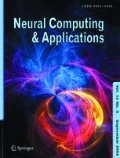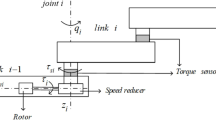Abstract
A novel decomposition-based distributed robust fault-tolerant control method is proposed for modular and reconfigurable robots based on joint torque sensing. The designed robust controller compensates for both model uncertainties and a class of actuator faults. In addition, the proposed scheme does not require a fault detection and diagnosis module, avoiding time delay associated with it. Furthermore, a radial basis function neural network-based compensation scheme is proposed to deal with the actuator saturation problem, which is especially critical when actuator fault has to be tolerated by the control system. Simulation results have shown the effectiveness of the presented method.












Similar content being viewed by others
References
Christoph HB, Jamie P (2018) Mori: a modular origami robot. IEEE Trans Mechatron 22(5):2153–2164
Dong B, Zhou F, Liu KP, Li YC (2018) Decentralized robust optimal control for modular robot manipulators via critic-identifier structure-based adaptive dynamic programming. Neural Comput Appl. https://doi.org/10.1007/s00521-018-3714-8
Tommaso R, Matteo C, Giada G, Iris DF, Arianna M (2016) A soft modular manipulator for minimally invasive surgery: design and characterization of a single module. IEEE Trans Robot 32(1):187–200
Zhang JX, Yang GH (2017) Robust adaptive fault-tolerant control for a class of unknown nonlinear systems. IEEE Trans Ind Electron 64(1):585–594
Yang Y, Yue D (2019) Observer-based decentralized adaptive NNs fault-tolerant control of a class of large-scale uncertain nonlinear systems with actuator failures. IEEE Trans Syst Man Cybern 49(3):528–542
Yoo SJ, Kim T (2017) Predesignated fault-tolerant formation tracking quality for networked uncertain nonholonomic mobile robots in the presence of multiple faults. Automatica 77:380–387
Hao L, Yang G (2013) Robust fault tolerant control based on sliding mode method for uncertain linear systems with quantization. ISA Trans 52(5):600–610
Van M, Mavrovouniotis M, Ge SS (2018) An adaptive backstepping nonsingular fast terminal sliding mode control for robust fault tolerant control of robot manipulators. IEEE Trans Syst Man Cybern 49(7):1448–1458
Guo C, Li F, Tian Z, Guo W, Tan S (2019) Intelligent active fault-tolerant system for multi-source integrated navigation system based on deep neural network. Neural Comput and Applic. https://doi.org/10.1007/s00521-018-03975-z
Ao W, Song Y, Wen C (2017) Adaptive robust fault tolerant control design for a class of nonlinear uncertain MIMO systems with quantization. ISA Trans 68:63–72
Mekki H, Benzineb O, Boukhetala D, Tadjine M, Benbouzid M (2015) Sliding mode based fault detection, reconstruction and fault tolerant control scheme for motor systems. ISA Trans 57:340–351
Abdul S, Liu G (2008) Decentralised fault tolerance and fault detection of modular and reconfigurable robots with joint torque sensing. In: Proceedings of IEEE international conference on robotics and automation, Pasadena, CA, pp 3520–3526
Mohamed AK, Yu X, Zhang Y (2018) Fault-tolerant cooperative control design of multiple wheeled mobile robots. IEEE Trans on Control Syst Technol 26(2):756–764
Wu Y, Sun F, Zheng J, Song Q (2010) A robust training algorithm of discrete-time MIMO RNN and application in fault tolerant control of robotic system. Neural Comput and Applic 19(7):1013–1027
Van M, Ge SS, Ren H (2017) Finite time fault tolerant control for robot manipulators using time delay estimation and continuous nonsingular fast terminal sliding mode control. IEEE Trans Cybern 47(7):1681–1693
Zhao B, Li YC (2014) Local joint information based active fault tolerant control for reconfigurable manipulator. Nonlinear Dyn 77(3):859–876
Liu G, Abdul S, Goldenberg AA (2008) Distributed control of modular and reconfigurable robot with torque sensing. Robotica 26(1):75–84
Zhou F, Li Y, Liu G (2017) Robust decentralized force/position fault-tolerant control for constrained reconfigurable manipulators without torque sensing. Nonlinear Dyn 89:955–969
Benosman M, Lum KY (2010) Passive actuators’ fault-tolerant control for affine nonlinear systems. IEEE Trans Control Syst Technol 18(1):152–163
Ma Y, Yang P, Yan Y, Zhang Q (2017) Robust observer-based passive control for uncertain singular time-delay systems subject to actuator saturation. ISA Trans 67:9–18
Li H, Wang J, Shi P (2016) Output-feedback based sliding mode control for fuzzy systems with actuator saturation. IEEE Trans Fuzzy Syst 24(6):1282–1239
Su Y, Xu L, Li D (2016) Adaptive fuzzy control of a class of MIMO nonlinear system with actuator saturation for greenhouse climate control problem. IEEE Trans on Automat Sci Eng 13(2):772–788
Sun L, Wang Y, Feng G (2015) Control design for a class of affine nonlinear descriptor systems with actuator saturation. IEEE Trans Automat Control 60(8):2195–2200
He W, Dong Y, Sun C (2016) Adaptive neural impedance control of a robotic manipulator with input saturation. IEEE Trans Syst Man Cyber 46(3):334–344
Imura J, Sugie T, Yokokohji Y, Yoshikawa T (1991) Robust control of robot manipulators based on joint torque sensor information. In: Proceedings of IEEE/RSJ international workshop on intelligent robots and system, Osaka, Japan, pp 344–349
Yuan J, Liu G, Wu B (2011) Power efficiency estimation-based system monitoring and fault detection of modular and reconfigurable robot. IEEE Trans Ind Electron 58(10):4880–4887
Gao W, Selmic RR (2006) Neural network control of a class of nonlinear systems with actuator saturation. IEEE Trans Neural Netw 17(1):147–156
Acknowledgements
This work is supported by the National Natural Science Foundation of China (Grant Nos. 61374051, 61773075, and 61703055), the Scientific Technological Development Plan Project in Jilin Province of China (Grant Nos. 20170204067GX, 20190103004JH).
Author information
Authors and Affiliations
Corresponding author
Ethics declarations
Conflict of interest
The authors declare that they have no conflict of interest.
Additional information
Publisher's Note
Springer Nature remains neutral with regard to jurisdictional claims in published maps and institutional affiliations.
Rights and permissions
About this article
Cite this article
Zhou, F., Liu, K., Li, Y. et al. Distributed fault-tolerant control of modular and reconfigurable robots with consideration of actuator saturation. Neural Comput & Applic 32, 13591–13604 (2020). https://doi.org/10.1007/s00521-020-04768-z
Received:
Accepted:
Published:
Issue Date:
DOI: https://doi.org/10.1007/s00521-020-04768-z




